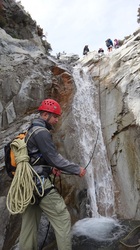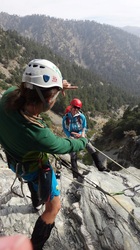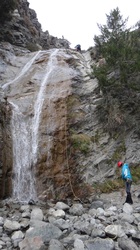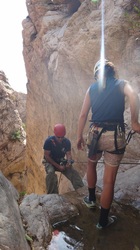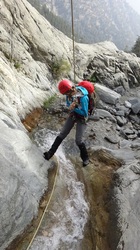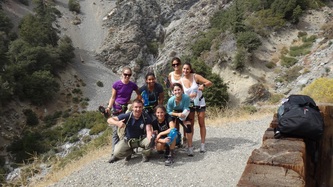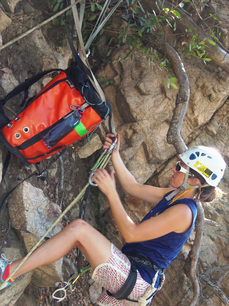
This past weekend, with a little help from the Vapur Element Anti-Bottle, a team of adventurers from the University of California, Santa Barbara and I braved a few good canyons in the San Gabriel Mountains of the Angeles National Forest.
Canyoneering is a sport particularly sensitive to hydration and energy management. Dehydration is cause for many ailments in the human body and we are especially at risk when in the harsh elements of the great outdoors. A typical canyon route imposes a series of slippery down climbs and steep rappels off waterfalls in a cold, wet environment. The coordination, physical fitness and knowledge required of executing such tasks assumes that even a completely healthy canyoneer could have trouble getting out safely.
“Hydration is incredibly crucial to physical performance,” says Rod Tucknott, Director of UCSB Adventure Programs and a Wilderness Medical Associates instructor. ”In fact many medical problems that aren’t so obvious, such as hyperthermia and hypothermia, are often exacerbated if not caused by dehydration.”
Prevention of accidents and injuries is key because if anyone on a canyon team goes down, there is usually only one way out. With steep cliffs on either side making simple egress virtually impossible, the originally intended route must be carried out in sickness or in health. Neglecting sufficient fluid intake can lead to light-headedness, fatigue and mental impairment, which are exceptionally dangerous conditions to be in. If left untreated, dehydration can also lead to heat exhaustion and even volume shock.
“The Vapur Anti-Bottles are awesome because they’re translucent,” said trip leader Ben Greiner, “so you can see exactly how much the participants have been drinking throughout the day. It’s easier to monitor their water intake and prevent any illnesses in the canyon.”
Taking full advantage of the low-profile and light weight nature of the Anti-Bottle, the canyoneers hung them from their harnesses and backpacks, making them incredibly accessible. With no excuses to not hydrate, this was a successful, healthy and amazingly FUN trip!
Canyoneering is a sport particularly sensitive to hydration and energy management. Dehydration is cause for many ailments in the human body and we are especially at risk when in the harsh elements of the great outdoors. A typical canyon route imposes a series of slippery down climbs and steep rappels off waterfalls in a cold, wet environment. The coordination, physical fitness and knowledge required of executing such tasks assumes that even a completely healthy canyoneer could have trouble getting out safely.
“Hydration is incredibly crucial to physical performance,” says Rod Tucknott, Director of UCSB Adventure Programs and a Wilderness Medical Associates instructor. ”In fact many medical problems that aren’t so obvious, such as hyperthermia and hypothermia, are often exacerbated if not caused by dehydration.”
Prevention of accidents and injuries is key because if anyone on a canyon team goes down, there is usually only one way out. With steep cliffs on either side making simple egress virtually impossible, the originally intended route must be carried out in sickness or in health. Neglecting sufficient fluid intake can lead to light-headedness, fatigue and mental impairment, which are exceptionally dangerous conditions to be in. If left untreated, dehydration can also lead to heat exhaustion and even volume shock.
“The Vapur Anti-Bottles are awesome because they’re translucent,” said trip leader Ben Greiner, “so you can see exactly how much the participants have been drinking throughout the day. It’s easier to monitor their water intake and prevent any illnesses in the canyon.”
Taking full advantage of the low-profile and light weight nature of the Anti-Bottle, the canyoneers hung them from their harnesses and backpacks, making them incredibly accessible. With no excuses to not hydrate, this was a successful, healthy and amazingly FUN trip!
